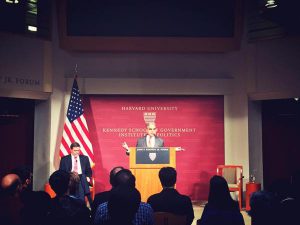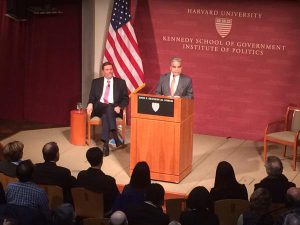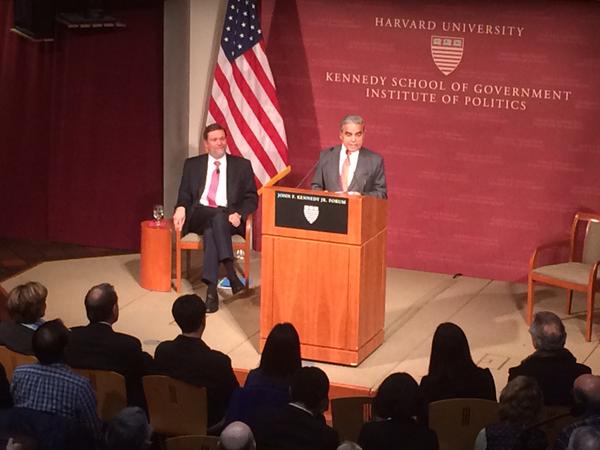
“What is one thing that will surprise the future generations of historians when China will overtake the United States as the world’s number one power?” asked one of Asia’s top thinkers, Kishore Mahbubani, to a crowded audience at JFK Forum on Wednesday while delivering this year’s Albert H. Gordon Lecture.
He paused and then replied: “American generosity to open the doors of its prestigious educational institutions for the students from all over the world, including China, America’s main competitor.”
To Mahbubani, the age of western domination is ending and the Asian century, led by China, is rapidly approaching.
“What happens when China Becomes Number One?” was the title of this year’s lecture which was moderated by David T. Ellwood, the Dean of Harvard Kennedy School of Government.
A former President of the United Nations Security Council and the current Dean of the Lee Kuan Yew School of Public Policy, Mahbubani delivered a message about the rise of China and what he viewed as the prevalent ignorance and indifference of the people, educational institutions and even the key media outlets in the Untied States about the changes taking place in Asia and how the U.S. will lose to China its position as the world’s top leader.
Mahbubani, who formerly served as Singapore’s Ambassador to the United Nations, billed the U.S.-China relationship ‘unique’ and ‘remarkable’ as both the countries had significantly helped each other in meeting their critical needs. The United States played an important role in ending China’s international isolation, making it a member of the United Nations and also introducing it as a member of the World Trade Organization (WTO). Above all, the United States has opened its doors to hundreds of thousands of Chinese students in its leading research and higher education institutions, an act of generosity that will amaze future historians.
“It is important to understand China’s aspirations,” he said and insisted that China had no intentions to expand communism across the world. The Communist Party of China (CCP) is struggling to end an epoch of Chinese humiliation and lead China into an era of pride and dignity.
“The Chinese Communist Party (CCP) should instead be called the Chinese Civilization Party (CPP).”
In 2010 and 2011, Foreign Policy named Mr. Mahbubani as one of Top Global Thinkers while Financial Times listed him in 2009 as one of the top 50 individuals.
Mr. Mahbubani, whose book the Great Convergence: Asia, the West and the Logic of One World, focuses on the rise of new world powers, such as China and India, that will dominate the United States, warned the political pundits in the United States not to wish the collapse of the Chinese Communist Party.
“Be careful what you wish for,” he cautioned, “if China had democracy today, it would generate a stronger Chinese nationalism. The CCP has contained a nationalist and assertive China.” He argued that it was in the greater global interest to allow the ruling party in China to evolve and let China focus on its economic growth.

